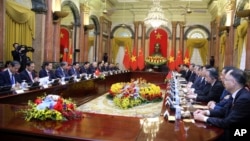An influx of Chinese investors in Vietnamese supporting industries could cause domestic businesses to suffer from the competition, the president of the Vietnam Association for Supporting Industries warned.
Phan Dang Tuat’s statement came a week after Vietnam and China agreed to expand their trade cooperation during Chinese President Xi Jinping's mid-December visit, during which the two countries signed 36 cooperation documents. Vietnam and China pledged to strengthen their cooperation in economic zones, investment, trade and other areas, said a joint statement issued on December 13.
According to economic experts, the agreements will open opportunities for Vietnam to attract high-quality direct investment from China.
But Tuat said the wave of Chinese supporting-industry firms arriving in the Southeast Asian country is concerning.
Supporting industries supply raw materials and components to manufacturers.
Tuat voiced his concern at the Ministry of Industry and Trade’s year-end conference on December 20, questioning the rapid and large-scale entry of Chinese firms into the market, according VN Express International, a Vietnamese newspaper.
Chinese supporting industry companies are flocking to Vietnam, swiftly forming large-scale components and parts production chains to export to Europe and North America, Tuat said.
“This is a huge concern for domestic supporting industry enterprises,” Tuat said, according to VN Express International.
China-U.S. trade war
Since then-U.S. President Donald Trump launched a trade war with China in 2018, many Chinese products have been found to be disguised or labeled as “Made in Vietnam” to avoid U.S. tariffs on goods imported from China, according to reports by Reuters.
The trade war has also encouraged Chinese firms to move their production to other countries, including Vietnam, to bypass U.S. tariffs.
Meanwhile, Tuat told the ministry’s conference that because of a lack of economies of scale, Vietnam's domestic firms are grappling with expensive capital and high manufacturing expenses, making it difficult to compete with Chinese firms, according to Vietnam-based Tuoi Tre.
Vietnamese companies in 2023 saw a 40% drop in revenue partly because of fewer orders from major markets, such as Europe, according to Tuat.
He also said that Vietnam’s unusually high lending rates have undermined the nation's supporting industry enterprises, which number about 1,500 companies. (Whereas Vietnamese firms are required to borrow from Vietnamese banks at rates of 10% to 12%, foreign investors can borrow abroad at significantly lower rates, according to reports by Tuoi Tre.)
Ha Hoang Hop, an associate senior fellow at Singapore-based ISEAS-Yusof Ishak Institute, told VOA: “This should serve as a wake-up call for Vietnam to speed up its supporting industries in order to catch up with Chinese competitors who are way ahead.”
There is reason for concern, Pham Chi Lan, former general secretary of Vietnam Chamber of Commerce and Industry, told VOA.
“But we need to face that fact and learn from the lesson in the past where foreign investors chose Chinese suppliers instead of Vietnamese for their production in Vietnam,” she said.
Semiconductors a potential boon
The U.S.-China trade war has led semiconductor investors to shift their focus to Vietnam, a potential boon for the Southeast Asian nation, according to Hop and Lan.
“The U.S. has included Vietnam in its ‘friendshoring’ network, and Vietnam should make the most out of this,” said Hop, referring to the practice of focusing supply chain networks in countries regarded as U.S. political and economic allies.
Experts said Vietnam is well-positioned to draw U.S. investors seeking to de-risk supply chain investments in China.
“The competition between the U.S. and China is getting intense when the U.S. is banning the export of some equipment and technology to China, and this is a great opportunity for Vietnam to be able to secure some deals,” said Hop, referring to the U.S. export ban on chipmaking equipment and rare-earth technologies.
Lan, who was an adviser to the late Vietnamese Prime Ministers Vo Van Kiet and Phan Van Khai, agreed with Hop.
“The U.S., Japan and European countries want Vietnam to be strong for their benefits instead of being weak and dependent on China,” Lan said.
Following an historic U.S.-Vietnam business summit in September that bolstered ties between the countries, Vietnam then elevated Japan into its circle of comprehensive strategic partners, on par with China, in November. Washington and Tokyo sought to upgrade ties with Hanoi to offset Beijing’s expansion of power in the region and reduce its dependence on Chinese supply chains, according to experts who spoke with VOA.
Announcing its new partnership with Vietnam, the U.S. State Department described it as a way “to explore opportunities to grow and diversify the global semiconductor ecosystem” that “will help create more resilient, secure and sustainable global semiconductor value chain.”
Vietnam is poised to expand into chip-designing and possibly chip-making as trade tensions between the United States and China create opportunities for the country, according to Lan and Hop.





